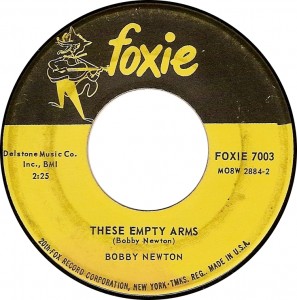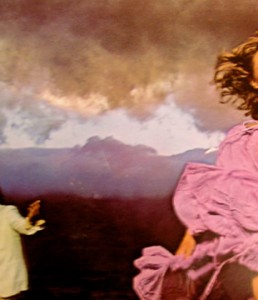This week we look at a few representative examples of a wonderfully dark, slow strain of post-War rhythm and blues.
The lyrical content has always hovered around the same subjects – lost love, deep loneliness, obsession, suicide, death – a cluster of images and motifs traceable in turn to a body of material popular with pre-War blues musicians – sepulchral, haunted laments and pleas like “St. James Infirmary Blues,” “One Kind Favor” or “Poor Boy Blues.”
With R&B’s national marketing and ever-increasing commercial viability in the post-War years, however, a certain set of standard stylistic indicators would crystallize. The aesthetic was embodied early on in R&B hits like the Dominoes’ “The Bells” (1952) and Nolan Strong and the Diablos’ “The Wind” (1954). Classics like Donald Woods and the Vel-Aires’ “Death of an Angel (1955),” Tarheel Slim & Little Ann “It’s Too Late” (1959) and the Vibrations’ “So Blue” (1960) further defined the aesthetic: spare instrumentation, spectral vocals and harmonies, a funereal beat. Some dramatic examples, like Billy Miranda’s “Go Ahead” (1959) and Jackie and the Starlites’ “Valarie” (1960) – not to mention “The Bells” and “Death of an Angel” – would feature actual sobbing. Most of all, there was a persistent, sometimes relentless, note or sequence of notes picked out on a piano or guitar, a droning, repetitive quality eerily conveying the very passage of time.
Soul music precipitated out of gospel and R&B in the late ‘50s and early ‘60s, but the basic sensibility would persist. Diamond Joe’s “Moanin’ and Screamin’” and Jean Knight’s “The Man That Left Me” held something of the funeral dirge at their heart. There is high cinema to this week’s three selections, too, a kind of voyeuristic pleasure to be taken from the drama and slow beat of despair. They go to those bleak places so we don’t have to.
 1. Merle Spears with Lionel Whitfield’s Orch., It’s Just a Matter of Time (Whit 713)
1. Merle Spears with Lionel Whitfield’s Orch., It’s Just a Matter of Time (Whit 713)
Who was Merle Spears? I can tell you little beyond what Sir Shambling provides at the excellent Deep Soul Heaven.
Born in 1939 in Louisiana, Merle Spears’s profile, or what we know of it, is not unlike other aspiring Southern and Gulf Coast R&B vocalists and musicians in the ‘60s. He cut a few records, probably performed live and made some guest appearances around Baton Rouge and Shreveport and, on occasion, may have provided his talents in the studio as a supporting musician.
If Spears never made the full-time leap into the professional music business, it was not for lack of talent. His recorded legacy is thin – a handful of 45s, all dating to the mid-‘60s – but consistently excellent, revealing a vocalist with a rich baritone and an unruffled sophistication that owes much to then-reigning Texas blues stylist Bobby Bland.
Among Spears’s handful of 45s are fine R&B dances like 1964’s “I Want to Know,” classy mid-tempo numbers like “Ain’t No Need” (the flipside to “It’s Just a Matter of Time”) and deep Southern fare like “Wisdom of a Fool.” But 1965’s riveting “It’s Just a Matter of Time” will always remain my personal favorite. Likely recorded at Cosimo Matassa’s legendary New Orleans studio (thanks to Ana B and Dan Phillips for that tidbit), here the debt to Bobby Bland is blatant. The production invokes the slowed-down meter of Bland ballads like “I’ll Take Care of You” or “Lead Me On,” Spears infusing his phrasing with an otherworldly, almost detached, level of emotion and foreboding.
This selection, as well as two other great Spears sides – “I Want to Know” and “Ain’t No Need” – were written by one Calvin Reed, a Baton Rouge-based musicians and songwriter. (Reed, also known, I believe, as Murray Reed, has a frustratingly vague biography as well.)
Notably, this 45 would also be an early release for producer and manager Lionel Whitfield and his Shreveport-based Whit Records, a label that would find some national success in the ‘60s with a series of records by blind R&B singer Bobby Powell.
Sadly, Merle Spears passed away in 2009.
 2. Bobby Newton, These Empty Arms (Foxie 7003)
2. Bobby Newton, These Empty Arms (Foxie 7003)
A singer and entertainer from Reading, Pennsylvania, Bobby Newton is the best-known and most prolific of this week’s three artists.
Recorded around 1961, released on Foxie Records (a brief-lived R&B and teen pop subsidiary of 20th Century Fox), “These Empty Arms” would be one of Newton’s earliest recordings. His releases over the next decade-and-a-half showcase a stylist changing with the times. Newton’s greatest gift was his versatility, his voice moving from mellow baritone to soul shout, often in the span of a single record.
Starting with 1968 dance number “The Whip,” many of Newton’s releases found him working with Philly singer, producer and songwriter Jesse James as well as with musicians from the chart-topping MFSB stable. Despite the cutting-edge professionalism of his productions and musical support, Newton was handicapped at times by somewhat undistinguished material. He seemed poised for broader success at several points without ever quite breaking through, and his commercial releases tapered off after the mid-‘70s.
Of his eight or nine 45s, “These Empty Arms” is easily among the most memorable. It is also the archetypal R&B dirge, all obsession and gloomy atmosphere, the arpeggiated guitar figure and Newton’s croon summoning, almost visibly, a sense of solitude and despair.
Bobby Newton is today still a force, and performs live with the Bobby Newton Band around Philadelphia area and southeastern Pennsylvania.
 3. Billy Sol with Orchestral Accompanyment: Punty Guitar & the Sensations, When You’re Alone (Domar DM-1124-A)
3. Billy Sol with Orchestral Accompanyment: Punty Guitar & the Sensations, When You’re Alone (Domar DM-1124-A)
R&B vocalist Billy Sol was likely Mexican-American, and almost certainly would have established himself on San Antonio’s West Side scene, a rich and fascinating milieu that produced pioneering groups like Sunny and the Sunliners, the Royal Jesters, Little Jr. Jesse and the Teardrops and Rudy and the Reno Bops and that became, along with East Los Angeles, one of the epicenters of Chicano R&B and soul in the ‘60s.
Sol’s place amongst the scene is poorly documented. Released in 1966, “When You’re Alone” is the second of his two 45s on Domar Records, one of several San Antonio labels operated by local music hustler Paul Beckingham. Sol’s third 45 was also released the eponymous Beckingham Records. (Domar Records is probably best remembered today for several raw 45s by local garage band the Five Canadians, though the label also released teen pop, West Side R&B instrumentals and more traditional conjunto sounds.)
A mix of harmony ballads, Twist-type dances and more current horn-and-organ-driven soul, the music on Sol’s three lone 45s, all from 1966, is fairly characteristic of the repertoire of many young Chicano R&B groups of the period in San Antonio. Even measured against the West Side scene’s somewhat flamboyant vocal standards – quivering ballad delivery, hoarse soul vocals and falsetto harmonies were typical – Sol’s singing style seems particularly dramatic.
This is amply affirmed on his version of “When You’re Alone,” a song originally recorded by the pop group the Hilltoppers in 1956. Sol – helped in no small part by masses of echo and a gritty, atmospheric backing arrangement – is spectacular here, taking a fairly conventional theme of heartbreak to some harrowing new level of finality.
Incidentally, Sol clearly had idiosyncratic and particular taste in covers; among his three 45s would be a version of the aforementioned “The Bells.”
















